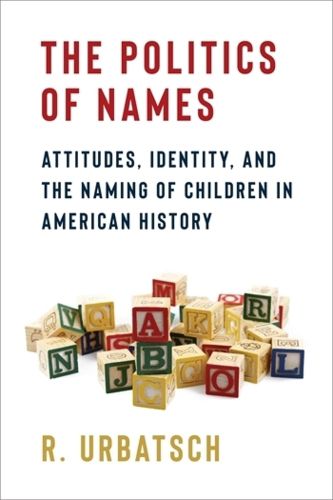Readings Newsletter
Become a Readings Member to make your shopping experience even easier.
Sign in or sign up for free!
You’re not far away from qualifying for FREE standard shipping within Australia
You’ve qualified for FREE standard shipping within Australia
The cart is loading…






Since the earliest days of the United States, some parents have felt moved to capture their political moment in their children's names. A Massachusetts child received the name Federal Constitution in 1790. The nineteenth century saw the name States Rights crop up across the South. A younger brother of a boy called McKinley in the early twentieth century was disproportionately likely to be named Roosevelt. Residents of areas that supported Reagan were prone to choose the spelling "Meagan" over "Megan." The name Hillary surged in popularity after the Clintons emerged on the political scene-then crashed just as dramatically. What do trends like these tell us about political identities and enthusiasms in the United States?
R. Urbatsch explores the politics of naming across American history, revealing the surprising ways parents' choices shed light on public opinion past and present. He argues that naming is a weathervane for political attitudes: Names touch on every sort of identity, from race and gender to nationalism and religion. Tracing the rise and fall of names that evoked the leaders, ideas, and issues that fired political imaginations of their times, Urbatsch opens new windows onto a wide range of historical questions. By analyzing when politics-tinged names gained or lost popularity, this book offers an unconventional and illuminating new perspective on identity, public sentiment, and political behavior in the United States.
$9.00 standard shipping within Australia
FREE standard shipping within Australia for orders over $100.00
Express & International shipping calculated at checkout
Since the earliest days of the United States, some parents have felt moved to capture their political moment in their children's names. A Massachusetts child received the name Federal Constitution in 1790. The nineteenth century saw the name States Rights crop up across the South. A younger brother of a boy called McKinley in the early twentieth century was disproportionately likely to be named Roosevelt. Residents of areas that supported Reagan were prone to choose the spelling "Meagan" over "Megan." The name Hillary surged in popularity after the Clintons emerged on the political scene-then crashed just as dramatically. What do trends like these tell us about political identities and enthusiasms in the United States?
R. Urbatsch explores the politics of naming across American history, revealing the surprising ways parents' choices shed light on public opinion past and present. He argues that naming is a weathervane for political attitudes: Names touch on every sort of identity, from race and gender to nationalism and religion. Tracing the rise and fall of names that evoked the leaders, ideas, and issues that fired political imaginations of their times, Urbatsch opens new windows onto a wide range of historical questions. By analyzing when politics-tinged names gained or lost popularity, this book offers an unconventional and illuminating new perspective on identity, public sentiment, and political behavior in the United States.